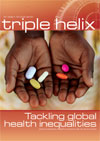WHO seeks new Director General
Eutychus notes that the search is underway for a new Director General of the WHO. The appointee will be elected at the WHO Assembly in May 2017, succeeding Margaret Chan who's been in the job for ten years. Despite many commendable achievements, Chan's administration attracted sharp criticism for sluggishness in responding to the Ebola crisis and WHO was forced to re-shape emergency protocols. This is a huge role in a huge organisation and Christians in global healthcare are encouraged to take a prayerful interest in the search process and its outcome.
WHO news release, 21 April 2016
Lack of beds affects mental health services
Freedom of information requests are proving something of a thorn in the side of the NHS. Apparently they are up 13% since 2014. Moreover data unearthed through these requests showed that nearly 5,500 mental health patients had to travel out of their area due to lack of hospital beds. Some had to travel more than 300 miles. While it can at times be appropriate to send a patient outside their area, especially for highly-specialised care, sending people a long way out of their local community means risks, including risk of suicide.
BBC Health, 20 May 2016
End of polio?
Some 150 countries are taking up a new polio vaccine which, according to healthcare campaigners, signals a key milestone toward eradication of this terrible disease. There were just 74 cases of polio in 2015 and ten so far this year. All of the cases were in Afghanistan and Pakistan. Africa has been free of polio for more than a year. The new vaccine is taken via drops in the mouth so requires minimal training for those administering it. Even so, switching to a new vaccine is a huge logistical exercise.
BBC Health, 17 April 2016
Health of indigenous peoples
A landmark study from 23 well-off countries shows that the health of indigenous or first nation peoples is often little better than those living in resource-poor countries. Data on the health and wellbeing of almost half of the world's indigenous and tribal peoples is captured in this joint project by the Lancet and Australia's Lowitja Institute. Factors assessed were: life expectancy at birth, infant mortality, maternal mortality, nutritional status, educational attainment and poverty. 'Indigenous people should not just be brought to the table, but be co-designers in solutions,' the study said.
Guardian, 21 April 2016
Loneliness linked to stroke
Loneliness is a public health issue, raises the risk of stroke and should be treated as a public health problem like smoking or over-eating, a new study from York University says. The research reviewed 23 studies involving 181,000 people. Lonely people, it claims, are 30% more likely to suffer stroke or heart disease. It has been linked to a compromised immune system and high blood pressure. 'Addressing loneliness and social isolation may have an important role in the prevention of two of the leading causes of morbidity in high-income countries', claimed York's University's Dr Nicole Valtorta.
Telegraph, 19 April 2016
Who cares for carers?
Numbers of people in their 80s and beyond who are relied on as carers has rocketed in the last seven years according to Age UK. It claims one in seven of 'oldest old' - nearly 420,000 people, provide some sort of unpaid care for family or friends, with half of them give more than 35 hours a week. Needless to say, many report being exhausted and worried about how long they can carry on. The findings come from an annual representative household survey of 15,000 people aged 60 and more.
BBC News, 18 May 2016
Change of scene
China's population police used to be notorious. Stationed in every community, they hunted down families who defied the draconian one-child laws. They had powers to levy heavy fines and even order abortions without anaesthetic. Now, after 35 years, China has realised the folly of this policy; it created a lopsided male-female population balance and generations of hostile and dysfunctional males denied a marriage partner. Now, former officers are being redeployed, teaching families to develop the minds and social skills of their toddlers through talking, singing and reading to them.
BBC News, 4 May 2016
Alcohol, good for you?
Not so. Studies suggesting that moderate drinking of alcohol brings health benefits are flawed, new research claims. Earlier studies suggested a glass of wine a day reduced hazards such as risk of heart disease. A review of 87 past research papers concluded, however, that these studies were flawed - biased and poorly designed. One researcher in the Canadian team conducting the review said, 'There's a general idea out there that alcohol is good for us, because that's what you hear reported all the time, but there are many reasons to be sceptical.'
CBS News, 22 March 2016
Probiotic ballyhoo
For many, a daily swig of a probiotic drink is a bit like a religious act. Makers of Yakult, Actimel and the like have built a £20billion global industry. Six in ten British households use them. Now scientists say there is 'no convincing evidence' of benefits for healthy people. Danish researchers reviewed seven trials. Their conclusion: they made little difference to the make-up of the gut's bacteria in most cases. In six of the seven trials there was no difference in the bacteria between adults given probiotics or placebos.
Daily Mail, 10 May 2016
'Wellness' scam unmasked On the theme of ballyhoo, Eutychus notes that the Australian state of Victoria's consumer watchdog has initiated legal action against 'wellness' blogger Belle Gibson (see 'Wellness': a new gnosticism, Eutychus, Triple Helix, issue 65). Gibson initiated an elaborate scam, launching a book and lifestyle app, The Whole Pantry, where she claimed she beat brain cancer using natural remedies. 'None of it's true,' she finally admitted. She faces costs of up to £500,000 in fines and legal fees. Alarmingly, her publisher, Penguin, failed to properly investigate her claims.
Guardian, 11 May 2016































